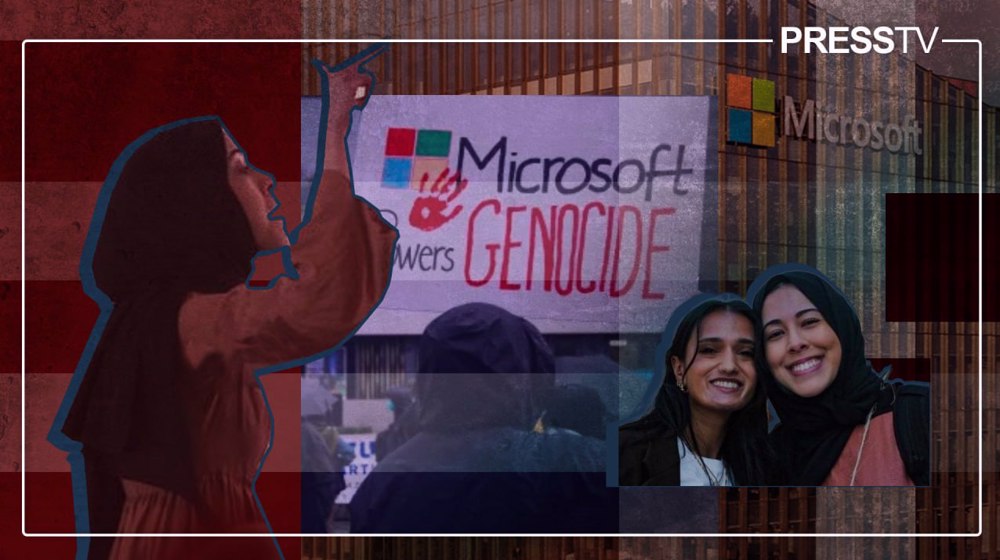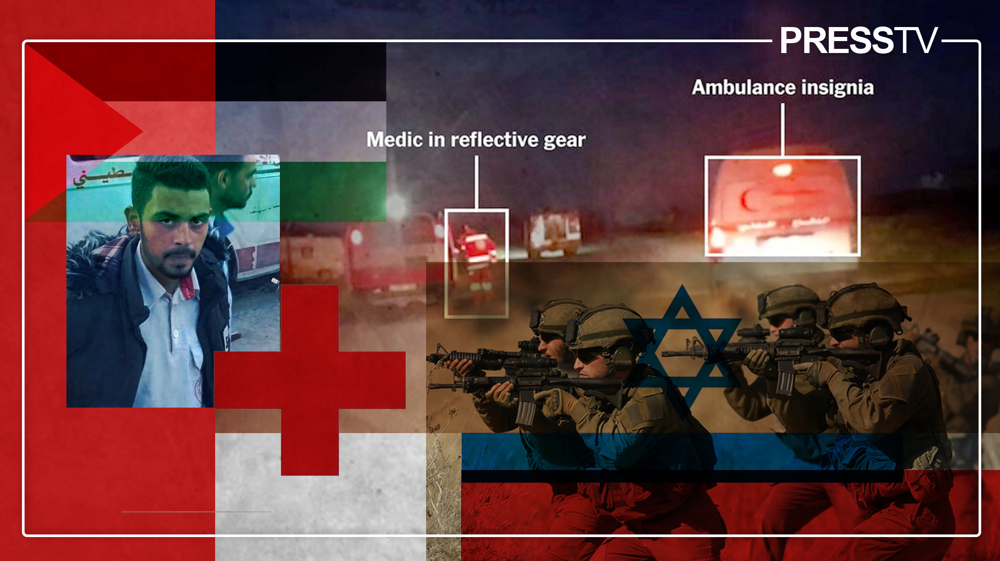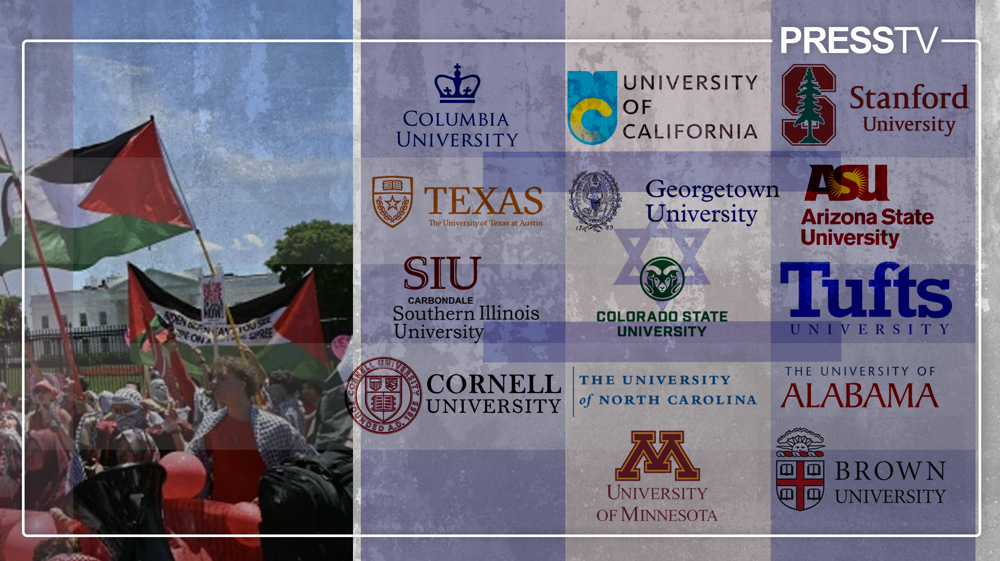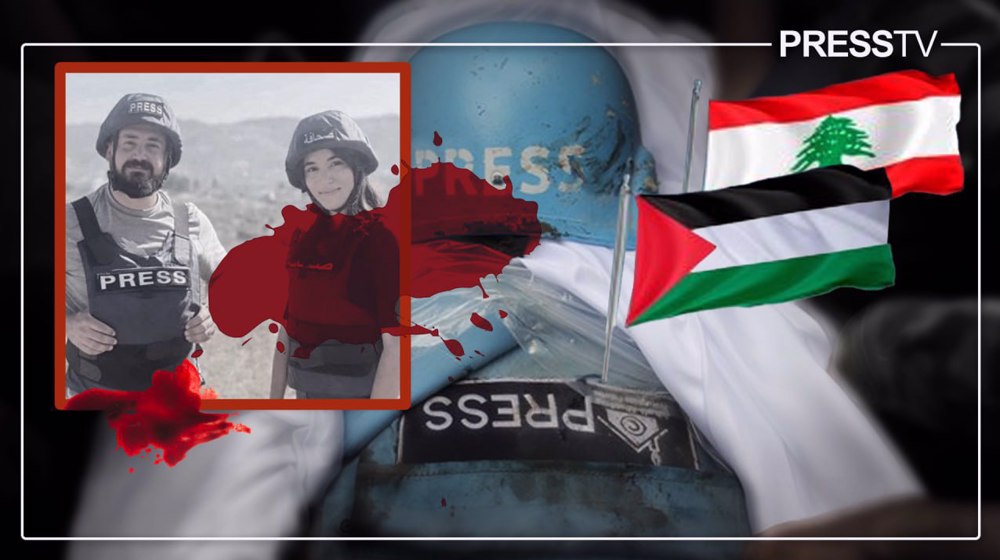Silenced: Journalists in Gaza, south Lebanon killed for exposing Zionist crimes
By Humaira Ahad
“Life will not last, hug those you love." This was a post the 25-year-old Lebanese journalist Farah Omar had pinned on her X account, formerly Twitter, days before her killing.
Omar and her colleague Rabih al-Maamari, Beirut-based journalists, were killed in an Israeli airstrike on Tuesday while reporting from the outskirts of the town of Tayr Harfa – about 3.5 kilometers from the Lebanese border with occupied territories.
A video clip of the location where they were targeted showed bodies strewn in an open field, a camera mounted on a tripod and press vests scattered all around the place.
Omar had been working as an editor and correspondent for the Lebanon-based Al Mayadeen news network since 2021.
The intrepid journalist had covered important events for the channel, including the Turkish presidential elections in May and the Lebanese parliamentary elections in 2022.
"Farah is gone, but there will be a million more like her... What happened is an offering for the sake of Sayyed Hassan Nasrallah (the leader of the Lebanese Hezbollah resistance group), and the resistance will live on," the grieving father said at his daughter’s funeral.
In her last tweet, the young war reporter had lauded Yemen’s Ansarallah resistance movement for seizing an Israeli ship, calling it "a heroic and honorable act."
“Known for her bravery, Farah insisted on covering the unfolding events in southern Lebanon, conveying the truth, and giving the ultimate sacrifice in pursuit of her message,” her employers said in a statement after her tragic death.
A senior Al Mayadeen photojournalist Maamari, also killed in the attack, was working with the Beirut-based news network since 2012. Father of two children, aged 4 and 2 respectively, he was an important member of Al Mayadeen’s news team.
The 44-year-old photojournalist was in the field since October 7, covering all developments in southern Lebanon amid the Israeli regime’s indiscriminate shelling.
In its condolence message, the Lebanese resistance group Hezbollah condemned the heinous crime, extending its commiserations to the Al Mayadeen channel and the families of the two martyrs, asserting that the Israeli aggression "will not go unanswered.”
In his statement, the Lebanese caretaker prime minister, Najib Mikati said the attack “proves once again that there are no limits to Israeli crimes, and that its only goal is to silence the media that exposes its crimes.”
Al Mayadeen’s director Ghassan Bin Jeddou, in his statement, said "Every correspondent in Lebanon today feels like Farah and every cameraman in Lebanon also feels like Rabih."
Shooting the messenger
The killing of two Lebanese journalists came amid a spate of murderous attacks by the Israeli regime on journalists in both southern Lebanon and the Gaza Strip since October 7.
As of November 25, the Committee to Protect Journalists (CPJ) says at least 53 journalists and media workers are among more than 14,000 Palestinians killed in the besieged Gaza Strip since the no-holds-barred onslaught was launched seven weeks ago.
Independent Palestinian groups have put the number of fatalities of journalists much higher.
The Palestinian Journalists Syndicate, in a statement on Saturday, said 66 journalists and media professionals have been killed in the Israeli aggression on the Gaza Strip since October 7.
A day before the killing of Omar and Maamari, a Palestinian freelance journalist Ayat Khadoura was killed along with her family members in an Israeli strike on her home in Beit Lahya, northern Gaza.
On November 6, Khadoura shared a video called “my last message to the world”, in which she said: “We had big dreams but our dream now is to be killed in one piece so they know who we are.”
On the same day that Khadoura was killed, Alaa Taher Al-Hassanat, a Palestinian journalist and presenter at AlMajedat Media Network, was also killed with her family members.
A day before their killing, on November 19, Jadallah, a prominent Palestinian journalist and director of Press House-Palestine was killed in his car in Gaza in an Israeli airstrike.
On November 18, Abdelhalim Awad, a media worker and driver for the Al-Aqsa TV was killed in an Israeli airstrike. His killing came hours after Mansour, director of the Quds News Network, and his colleague Hassouneh Salim were killed in an airstrike on the Bureij refugee camp in central Gaza.
Hassouneh Salim, a Palestinian freelance photojournalist, was also killed in the same airstrike on the Bureij refugee camp. Mostafa El Sawaf, a Gaza-based writer and analyst was also killed on the same day with his wife and two sons in an Israeli airstrike on his home in Gaza City.
Amro Salah Abu Hayah, a media worker with Al-Aqsa TV, and Ashour, a photojournalist, were also killed the same day in separate attacks. Ashour’s killing reportedly has taken place before.
Ahmed Fatima, a photojournalist for Al Qahera TV and a worker with Press House Palestine, was killed on November 13. The same day, Yaacoub Al-Barsh, a director of the Namaa Radio, succumbed to his injuries sustained in an attack a November 12.
On November 10, Ahmed Al-Qara, a photojournalist who worked for Al-Aqsa University and was a freelance journalist, was killed in an Israeli airstrike near Khan Yunis.
Three days before that, Yahya Abu Manih, a journalist with A-Aqsa radio station, was killed in a strike in Gaza City. Mohamed Abu Hassira, who worked for Wafa news agency, was also killed on the same day along with 42 members of his extended family.
Mohamed Al Jaja, a consultant at Press House Palestine, was killed in an airstrike with his wife and two daughters on November 5 in the Al-Naser neighborhood in northern Gaza.
On November 2, Mohammed Abu Hatab, a journalist and correspondent for Palestine TV was killed along with 11 members of his family in an Israeli airstrike on their home in Khan Yunis.
A day before that, Majd Fadl Arandas, a member of the Palestinian Journalists Syndicate, was killed in an airstrike on the Nuseirat refugee camp in the Gaza Strip. Iyad Matar, an Al-Aqsa TV journalist, was also killed earlier that day with his mother in the Gaza Strip.
Gaza – cemetery of journalists
It was the continuation of the killing spree of journalists in the Gaza Strip, occupied West Bank and southern Lebanon that started on October 7.
In the last seven weeks, hundreds of other journalists have also been reported missing, detained, or injured or their media offices and homes have been damaged in Israeli strikes.
The attack on Omar and Maamari was not an isolated incident in southern Lebanon. Israeli regime attacked a group of journalists there on 13 October as well, killing Essam Abdullah of Reuters and wounding three other journalists working for AFP and Al Jazeera.
CPJ President Jodie Ginsberg has dubbed the Israeli aggression since October 7 as the “deadliest period for journalists covering conflicts that CPJ has ever documented", adding that they have been recording attacks on journalists for more than thirty years worldwide.
In a statement, an organization for journalists in the Middle East and North Africa, CPJ MENA called for an "independent investigation" into the killing of journalists and emphasized that "journalists are civilians doing important work during times of crisis and must not be targeted by warring parties.”
Describing Gaza as the "cemetery of journalists," Reporters Without Borders (RSF) also voiced its concerns over journalism being eradicated in the Gaza Strip as a result of Israel’s aggression and a refusal to heed calls to protect media personnel.
“This rate of attrition among media workers has deeply shocked journalists the world over. No one can watch the growing tally of fallen colleagues without mounting horror,” Anthony Bellanger, the secretary-general for the International Federation of Journalists (IFJ), said in a statement on November 2.
RSF asserted that journalists were clearly identifiable by the virtue of wearing press vests and that missiles that struck them came from occupied Palestinian territories.
The Paris-based organization also submitted a complaint to the International Criminal Court (ICC) on October 31, saying the Israeli regime perpetrated war crimes against journalists in Gaza.
On Wednesday, Jonathan Dagher, the head of RSF’s West Asia desk said this is "one of the deadliest tolls in a century”, adding that “reporters there have no safe refuge and no way of leaving."
"They are being killed one after another. Since 7 October, the Palestinian territory has been subjected to a veritable eradication of journalism,” he said.

How Microsoft fuels Gaza genocide and silences employees who speak out

War on aid workers: How Israeli military turned Gaza's lifesavers into targets

More intl. students face deportation amid Trump's crackdown on pro-Palestine activism
VIDEO | Paris hosts week-long pro-Palestinian rallies
US ‘Tactical Terrorism Response Team’ flags pro-Palestinian attorney at customs
VIDEO | Pro-Palestine demonstrators in UK slam BBC
VIDEO | Protesters form human chain in front of US Embassy in London
Removal of US’s oppressive sanctions one of Iranian nation’s most basic rights: First VP
Gaza’s children paying for Netanyahu’s political ambitions with blood: Hamas
Hamas releases video showing Israeli-American captive alive
VIDEO | Iran marks National Nuclear Tech Day with new products







 This makes it easy to access the Press TV website
This makes it easy to access the Press TV website